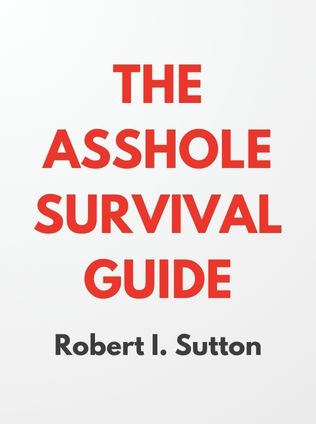
The Asshole Survival Guide
How to Deal with People Who Treat You Like Dirt
By Robert I. Sutton
Published 09/2017
About the Author
Robert I. Sutton, a distinguished professor of management science at Stanford University, is widely regarded for his research in organizational behavior and workplace dynamics. With a deep understanding of the intricacies of human behavior, Sutton has dedicated his career to studying how individuals and organizations can foster positive, productive environments. He has authored several influential books, including The No Asshole Rule, Good Boss, Bad Boss, and Scaling Up Excellence. His work is characterized by its accessibility, practical relevance, and grounded insights drawn from extensive academic research and real-world applications. Sutton’s influence extends beyond academia—he’s a fellow at the design and consulting firm IDEO, cofounder of the Stanford Technology Ventures Program, and a thought leader who frequently contributes to leading publications on leadership and management.
Main Idea
The Asshole Survival Guide tackles one of the most pervasive and challenging aspects of professional and personal life: dealing with difficult, toxic individuals who consistently disrupt harmony and productivity. Sutton’s guide is not merely a set of rules but a comprehensive survival manual, offering readers a variety of strategies to identify, manage, and mitigate the impact of jerks in their lives. By equipping readers with the tools to navigate these challenging interactions, Sutton empowers them to protect their mental and physical well-being, maintain their professional integrity, and ultimately thrive in environments where negativity might otherwise prevail.
The central thesis of Sutton’s work is that while you may not be able to change or avoid every difficult person, you can control your response to them. This control, he argues, is the key to minimizing the damage they can cause and preserving your own sense of self-worth and effectiveness. Sutton’s approach is grounded in psychological principles, making it not just a practical guide but a deeply insightful one that resonates with the realities of modern work and social environments.
Table of Contents
- Understanding the Problem
- Recognizing the Signs of Toxic Behavior
- The Consequences of Negative Interactions
- Strategies for Dealing with Difficult People
- Conclusion
Understanding the Problem
At the heart of The Asshole Survival Guide is the recognition that jerks—individuals who engage in consistently demeaning, disrespectful, or toxic behavior—are an unfortunate reality in many environments, particularly the workplace. Sutton defines a jerk not by a single action but by a pattern of behavior that causes harm to others. This harm manifests in various ways, from subtle undermining and manipulation to overt aggression and hostility. Sutton argues that while everyone can exhibit jerk-like behavior on occasion, true jerks are those whose actions are habitual and detrimental to the well-being of those around them.
"A jerk isn’t just someone having a bad day; it’s someone whose bad behavior is habitual and damaging to those around them." - Robert I. Sutton
The prevalence of jerks in the workplace is not just a matter of individual personalities; it’s often a reflection of organizational culture. In highly competitive or poorly managed environments, negative behaviors can proliferate, creating a breeding ground for jerks to thrive. Sutton emphasizes that understanding this context is crucial for developing effective strategies to deal with such individuals. By recognizing the broader patterns that enable toxic behavior, you can better navigate and counteract it.
Recognizing the Signs of Toxic Behavior
Identifying jerks is the first step in mitigating their impact. Sutton categorizes toxic individuals into several distinct types, each exhibiting different behaviors that can be damaging in their own ways:
- The Aggressor: This person uses intimidation and bullying as tools to dominate others, often masking their aggression under the guise of assertiveness. They may frequently raise their voice, invade personal space, or use threats to get what they want.
- The Underminer: Operating in the shadows, this jerk subtly sabotages others. They might spread rumors, withhold crucial information, or take credit for others’ work. Their goal is to weaken others to make themselves look stronger by comparison.
- The Manipulator: This type of jerk uses deceit and emotional manipulation to control situations to their advantage. They are skilled at twisting words and playing on others' emotions, often making others feel guilty or responsible for their own problems.
- The Inconsiderate: Although less overtly harmful, this individual consistently disregards the needs and feelings of others, creating a hostile or uncomfortable environment. They may interrupt conversations, fail to listen, or make decisions that affect others without consulting them.
Sutton stresses that while these behaviors can sometimes be subtle, their cumulative effect can be profoundly damaging. The ability to recognize these signs early on allows you to take proactive measures to protect yourself and others from their negative influence.
Sign up for FREE and get access to 1,400+ books summaries.
You May Also Like
The Subtle Art of Not Giving a F*ck
A Counterintuitive Approach to Living a Good Life
By Mark MansonRich Dad Poor Dad
What the Rich Teach Their Kids About Money - That the Poor and Middle Class Do Not!
By Robert T. KiyosakiHow To Win Friends and Influence People
The All-Time Classic Manual Of People Skills
By Dale CarnegieFreakonomics
A Rogue Economist Explores the Hidden Side of Everything
By Steven D. Levitt and Stephen J. Dubner



















